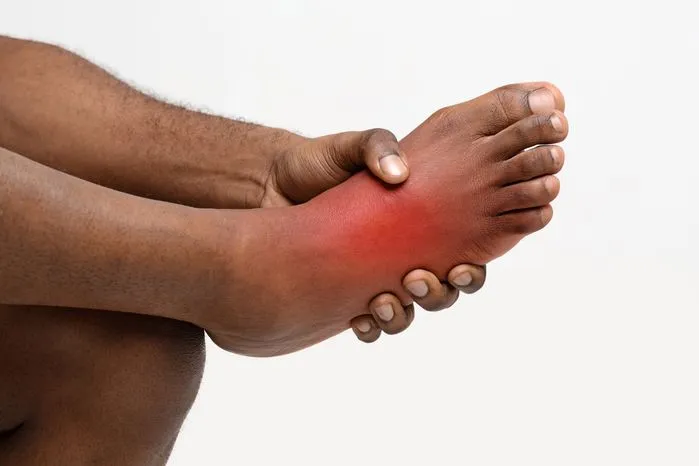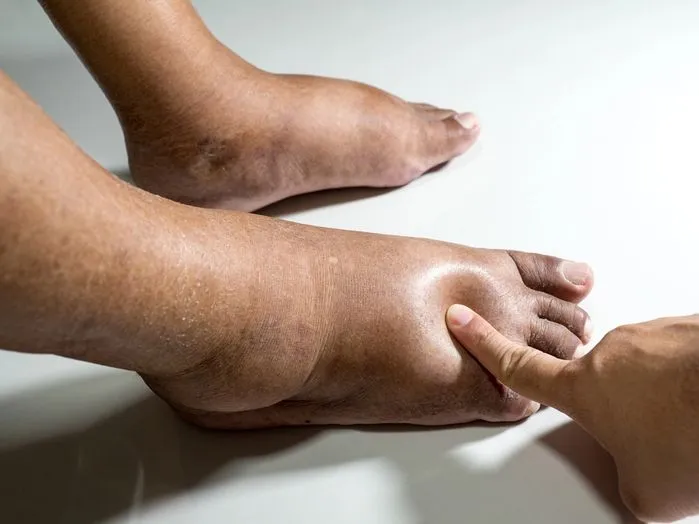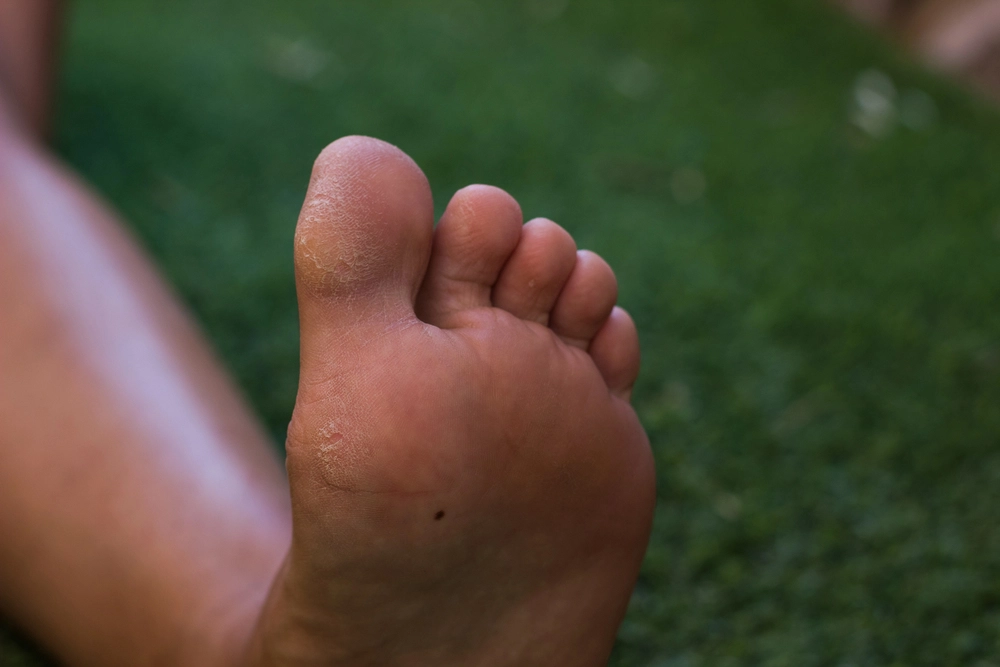
For many living with diabetes, foot numbness and tingling are more than just strange sensations; they’re early warning signs of nerve damage that can progress without clear symptoms at first. Drawing from clinical research and real patient experiences, this page goes beyond generic advice to explain why these symptoms occur, how they signal deeper issues like diabetic neuropathy, and what steps make a difference in prevention.
Top 5 Takeaways
✅ Numbness = Early Warning Sign
- Tingling or numb feet may signal diabetic neuropathy.
- These are often early signs of nerve damage.
✅ High Blood Sugar is the Root Cause
- Excess glucose harms nerve fibers.
- Poor circulation worsens the damage.
✅ Catch Symptoms Early
- Watch for burning, tingling, cold sensations, or balance issues.
- Early action helps prevent ulcers and amputations.
✅ Lifestyle Changes Matter
- Control blood sugar.
- Stay active.
- Eat a nutrient-rich diet.
- Stop smoking.
✅ Foot Care is Essential
- Check feet daily.
- Wear supportive shoes.
- Schedule regular doctor visits.
- Treat injuries right away.
Understanding The Conditions
Diabetes often leads to a nerve damage condition known as neuropathy. This common diabetic complication can cause numbness or tingling sensations, predominantly in the feet or lower extremities.
Peripheral Neuropathy, a specific type of neuropathy, affects the nerves controlling sensation. Damage to these nerves could result in loss of feeling in affected parts, with diabetic individuals frequently reporting this in their feet.
Its Causes
This neuropathy type, stemming directly from diabetes, primarily affects foot and leg nerves. Heightened blood glucose levels can harm nerve fibers in the body, with legs and feet being especially susceptible.
Circulation issues also contribute significantly. Frequently, diabetes brings about peripheral vascular disease, affecting blood flow to the limbs.
Recognizing Symptoms Early
In its management, early symptom recognition, notably foot numbness, is of utmost importance. This helps prevent severe complications such as foot ulcers or even amputation. Initial signs might present as a faint tingling or slight numbness in one or both feet.
Being aware of symptoms aids in the timely detection of foot numbness, which may begin at the toes and gradually extend to the entire foot. People with it might also feel their feet burning or cold, regardless of ambient temperature.
Prevention Strategies
Adjustments such as adhering to nutritious eating habits, engaging in regular physical activities, and with smoking cessation, can drastically cut down the risk of diabetic neuropathy.
Implementing these changes fosters better overall health, contributing to improved abilities in managing blood sugar levels – a fundamental aspect in curbing complications.
Maintaining Foot Health
Foot hygiene holds critical importance, as any neglect could lead to infections. If left untreated, such infections might require amputation.
People living with the condition often experience circulation problems leading to numbness and slowing down wound healing. Regular exercise and choosing the right footwear are helpful if you have this illness.
“As clinicians who has spent over a decade treating patients with diabetes-related neuropathy, we can tell you this: numbness and tingling in the feet aren’t just symptoms — they’re silent alarms. In many cases, these subtle sensations are the only early warning we get before nerve damage becomes irreversible. The patients who act early — through consistent foot care, lifestyle changes, and vigilant blood sugar control — often avoid the devastating outcomes we unfortunately still see far too often, like chronic ulcers or even amputation. Prevention isn’t just possible — it’s powerful.”
Supporting Facts and Statistics
1. 50% of People with Diabetes Develop Nerve Damage
- "I often see patients surprised that tingling or numbness in their feet is a sign of nerve damage."
- Nearly half of all individuals with diabetes will experience some form of neuropathy.
- Early symptoms can be subtle but signal serious underlying issues.
2. Up to 50% of Neuropathy Cases Are Symptom-Free
- "Many patients don’t know they have nerve damage until it’s advanced."
- Diabetic peripheral neuropathy often shows no early symptoms.
- Regular foot exams are crucial, even without pain or tingling.
3. Long-Term Diabetes Increases Neuropathy Risk
- "After 10+ years with Type 2 diabetes, neuropathy becomes more common in my patients."
- 15% to 50% of people with Type 2 diabetes for 10+ years develop peripheral neuropathy.
- Prevention becomes harder as time goes on without proper control.
These aren’t just stats — they reflect what patients and clinicians face every day. Early detection, lifestyle change, and foot care save limbs and lives.
Final Thoughts & Opinion
After working closely with diabetic patients and supporting family members with the condition, one thing is clear:
Foot numbness and tingling are early red flags — not random or harmless.
They often signal nerve stress or damage long before visible complications emerge.
Why This Matters
Too often, these early symptoms are ignored until they escalate into infections, ulcers, or worse. But small, consistent habits can make a life-changing difference.
Key Lessons from Experience
- Don’t ignore early warning signs. Tingling, numbness, or burning sensations are not “normal” parts of aging or fatigue — they often point to diabetic neuropathy.
- Everyday actions matter. A short daily walk, consistent blood sugar monitoring, or inspecting your feet before bed adds up over time.
- Foot care is proactive, not reactive. Prevention beats treatment every time — especially when dealing with irreversible nerve damage.
You have more control than you think. The steps you take today can preserve your mobility, independence, and long-term health.
Frequently Asked Questions
How do you get rid of diabetic foot numbness?
To get rid of diabetic foot numbness, you need to manage your blood sugar levels effectively. A healthy diet, regular physical activity, and prescribed medication can help in controlling your blood sugar. Regular check-ups with your doctor are also essential to monitor your condition. In addition, you can use pain relievers or anti-seizure drugs prescribed by your doctor to manage the numbness and pain associated with the condition.
Is diabetic foot numbness reversible?
Diabetic foot numbness, a symptom of peripheral neuropathy, is not always reversible. Once the nerves are damaged, they cannot be repaired. However, controlling blood sugar levels can prevent further damage and reduce the severity of the symptoms. Physical therapy might also help improve mobility and reduce numbness.
What are the signs of diabetic feet?
Signs of diabetic feet include numbness or tingling, pain or a burning sensation, ulcers, infections, changes in skin color, foot deformities like bunions or hammertoes, and loss of sensation. It's important to seek immediate medical attention if you notice any of these symptoms to prevent complications.
At what stage of diabetes does neuropathy start?
Neuropathy, specifically, peripheral neuropathy, typically starts in the later stages of diabetes, often after 10 to 20 years of living with the disease. However, it can occur earlier if diabetes is poorly controlled. Patients with high blood sugar levels for a prolonged period are more likely to develop neuropathy.
What are three things you should never do to the feet of someone with diabetes?
Three things you should never do to the feet of someone with diabetes are: never ignore any wounds or blisters, even if they are small; avoid using heating pads or hot water bottles as they can cause burns due to lack of sensation; and do not cut their toenails too short or in corners to avoid causing injuries or ingrown toenails.
What is the best vitamin for diabetic neuropathy?
The best vitamin for diabetic neuropathy is Vitamin B12. It is essential for nerve health, and a deficiency can lead to neuropathy. B12 can be found in foods like fish, meat, eggs, and dairy or can be taken as a supplement if necessary.
What are the 7 vitamins that repair nerve damage?
The 7 vitamins that help repair nerve damage include B vitamins (B1, B6, B12), Vitamin E, Vitamin D, Magnesium, and Omega-3 fatty acids. These vitamins support nerve health and can aid in reducing the symptoms of neuropathy.
Can you live a long life with diabetic neuropathy?
Yes, you can live a long life with diabetic neuropathy. However, it requires careful management of diabetes, regular check-ups, a healthy lifestyle, and medication to control symptoms. It's crucial to monitor and manage any symptoms to prevent complications.
What drink is good for neuropathy?
Drinks that are good for neuropathy include green tea and chamomile tea. They have anti-inflammatory properties that can help reduce inflammation in the nerves. Always remember to keep your drinks unsweetened to avoid increasing your sugar levels.
Do compression socks help neuropathy?
Compression socks can help with neuropathy by improving circulation in the feet and legs. They can reduce pain and swelling and promote healthier nerve functioning. However, they should be used under the guidance of a healthcare professional.
What are 7 foods that may heal nerve damage?
Seven foods that may heal nerve damage include fish, eggs, green leafy vegetables, lean meats, whole grains, fruits, and nuts. These foods are rich in vitamins and minerals that support nerve health.
Is diabetic neuropathy a disability?
Diabetic neuropathy can be considered a disability if it significantly limits your ability to perform normal daily activities or work. The Social Security Administration has guidelines for determining if a person's condition qualifies as a disability.


















